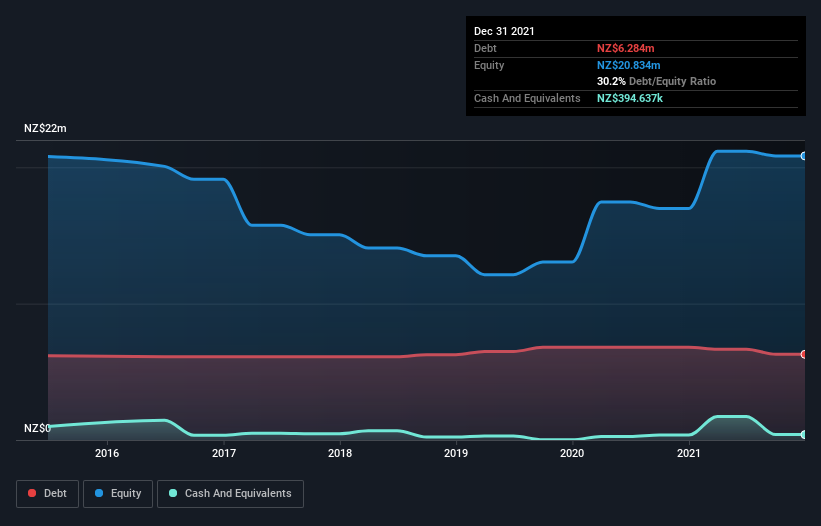- New Zealand
- /
- Beverage
- /
- NZSE:MWE
Marlborough Wine Estates Group (NZSE:MWE) Is Carrying A Fair Bit Of Debt

David Iben put it well when he said, 'Volatility is not a risk we care about. What we care about is avoiding the permanent loss of capital.' It's only natural to consider a company's balance sheet when you examine how risky it is, since debt is often involved when a business collapses. Importantly, Marlborough Wine Estates Group Limited (NZSE:MWE) does carry debt. But the real question is whether this debt is making the company risky.
When Is Debt Dangerous?
Debt assists a business until the business has trouble paying it off, either with new capital or with free cash flow. In the worst case scenario, a company can go bankrupt if it cannot pay its creditors. However, a more usual (but still expensive) situation is where a company must dilute shareholders at a cheap share price simply to get debt under control. Of course, plenty of companies use debt to fund growth, without any negative consequences. When we think about a company's use of debt, we first look at cash and debt together.
View our latest analysis for Marlborough Wine Estates Group
How Much Debt Does Marlborough Wine Estates Group Carry?
As you can see below, Marlborough Wine Estates Group had NZ$6.28m of debt at December 2021, down from NZ$6.80m a year prior. On the flip side, it has NZ$394.6k in cash leading to net debt of about NZ$5.89m.

How Strong Is Marlborough Wine Estates Group's Balance Sheet?
We can see from the most recent balance sheet that Marlborough Wine Estates Group had liabilities of NZ$913.7k falling due within a year, and liabilities of NZ$8.54m due beyond that. Offsetting these obligations, it had cash of NZ$394.6k as well as receivables valued at NZ$745.1k due within 12 months. So its liabilities outweigh the sum of its cash and (near-term) receivables by NZ$8.31m.
Given Marlborough Wine Estates Group has a market capitalization of NZ$65.2m, it's hard to believe these liabilities pose much threat. Having said that, it's clear that we should continue to monitor its balance sheet, lest it change for the worse. When analysing debt levels, the balance sheet is the obvious place to start. But it is Marlborough Wine Estates Group's earnings that will influence how the balance sheet holds up in the future. So if you're keen to discover more about its earnings, it might be worth checking out this graph of its long term earnings trend.
Over 12 months, Marlborough Wine Estates Group reported revenue of NZ$7.6m, which is a gain of 12%, although it did not report any earnings before interest and tax. That rate of growth is a bit slow for our taste, but it takes all types to make a world.
Caveat Emptor
Over the last twelve months Marlborough Wine Estates Group produced an earnings before interest and tax (EBIT) loss. To be specific the EBIT loss came in at NZ$662k. When we look at that and recall the liabilities on its balance sheet, relative to cash, it seems unwise to us for the company to have any debt. Quite frankly we think the balance sheet is far from match-fit, although it could be improved with time. Another cause for caution is that is bled NZ$704k in negative free cash flow over the last twelve months. So suffice it to say we do consider the stock to be risky. There's no doubt that we learn most about debt from the balance sheet. However, not all investment risk resides within the balance sheet - far from it. For example, we've discovered 3 warning signs for Marlborough Wine Estates Group (1 is potentially serious!) that you should be aware of before investing here.
If, after all that, you're more interested in a fast growing company with a rock-solid balance sheet, then check out our list of net cash growth stocks without delay.
New: Manage All Your Stock Portfolios in One Place
We've created the ultimate portfolio companion for stock investors, and it's free.
• Connect an unlimited number of Portfolios and see your total in one currency
• Be alerted to new Warning Signs or Risks via email or mobile
• Track the Fair Value of your stocks
Have feedback on this article? Concerned about the content? Get in touch with us directly. Alternatively, email editorial-team (at) simplywallst.com.
This article by Simply Wall St is general in nature. We provide commentary based on historical data and analyst forecasts only using an unbiased methodology and our articles are not intended to be financial advice. It does not constitute a recommendation to buy or sell any stock, and does not take account of your objectives, or your financial situation. We aim to bring you long-term focused analysis driven by fundamental data. Note that our analysis may not factor in the latest price-sensitive company announcements or qualitative material. Simply Wall St has no position in any stocks mentioned.
About NZSE:MWE
Slight with mediocre balance sheet.
Market Insights
Community Narratives




